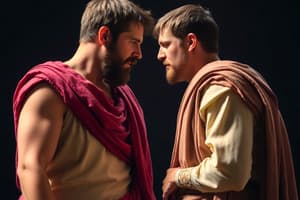Podcast
Questions and Answers
What does the setting of Brutus' orchard symbolize in relation to his character's internal struggles?
What does the setting of Brutus' orchard symbolize in relation to his character's internal struggles?
Brutus' orchard symbolizes secrecy and isolation, mirroring his internal turmoil and hidden motivations regarding the conspiracy.
How does Brutus's soliloquy reveal his moral dilemmas regarding Caesar's assassination?
How does Brutus's soliloquy reveal his moral dilemmas regarding Caesar's assassination?
Brutus's soliloquy highlights his deep conflict between patriotic duty and personal reservations about using violence for political purposes.
In what way does Cassius manipulate Brutus's emotions to encourage his participation in the conspiracy?
In what way does Cassius manipulate Brutus's emotions to encourage his participation in the conspiracy?
Cassius uses rhetorical questions and emotional appeals to reassure Brutus, presenting the assassination as a justified act to protect Rome.
What elements of foreshadowing are present in the scene between Brutus and Cassius?
What elements of foreshadowing are present in the scene between Brutus and Cassius?
Describe how the theme of secrecy plays a role in the portrayal of the conspiracy.
Describe how the theme of secrecy plays a role in the portrayal of the conspiracy.
What are Brutus's concerns regarding the possible aftermath of Caesar's assassination?
What are Brutus's concerns regarding the possible aftermath of Caesar's assassination?
How does the imagery of fear and mistrust contribute to the overall tone of the scene?
How does the imagery of fear and mistrust contribute to the overall tone of the scene?
What contrasts exist between Brutus and Cassius regarding their motivations for the conspiracy?
What contrasts exist between Brutus and Cassius regarding their motivations for the conspiracy?
Flashcards
Significance of Brutus' orchard
Significance of Brutus' orchard
Brutus's orchard symbolizes the concealed emotions and motives of the conspirators. The isolated setting mirrors the internal turmoil of Brutus, and the secrecy emphasizes the clandestine nature of their plot.
Brutus's moral dilemma
Brutus's moral dilemma
Brutus wrestles with his conscience, torn between his commitment to Rome and his moral reservations about assassination. He fears the consequences of their actions and the potential for violence.
Cassius's manipulation of Brutus
Cassius's manipulation of Brutus
Cassius, a skilled manipulator, reassures Brutus by appealing to his patriotism and ambitions. He presents the assassination as a necessary act for Rome's protection.
Secrecy and potential conflict within the conspiracy
Secrecy and potential conflict within the conspiracy
Signup and view all the flashcards
Foreshadowing and imagery in the scene
Foreshadowing and imagery in the scene
Signup and view all the flashcards
Fear and mistrust in the conspiracy
Fear and mistrust in the conspiracy
Signup and view all the flashcards
Conflicting motivations of the conspirators
Conflicting motivations of the conspirators
Signup and view all the flashcards
Brutus as a tragic hero
Brutus as a tragic hero
Signup and view all the flashcards
Study Notes
Setting and Characters
- The scene opens in Brutus' orchard, a setting rich with symbolism. Its secrecy and isolated nature mirror the interior turmoil and hidden motivations of the characters.
- Brutus, alone in the contemplation of his weighty decisions, is the central figure.
- Cassius arrives, immediately perceiving Brutus's melancholic mood. Their conversation focuses on the noble aims of their conspiracy, but also underscores the doubts and anxieties simmering beneath the surface.
Brutus's Moral Dilemmas
- Brutus grapples deeply with his moral convictions, questioning the justness of resorting to violence to achieve political aims. He is torn between his patriotic duty and personal reservations about assassinating Caesar.
- He expresses concern regarding the potential backlash against the conspirators, foreshadowing the tragic consequences of their actions.
- Brutus's soliloquy reveals his internal conflict and the struggle to justify his actions by aligning them with the greater good.
Cassius's Manipulation and Persuasion
- Cassius, unlike Brutus, appears more pragmatic and driven by self-interest. He expertly maneuvers to reassure Brutus's anxieties and bolsters his confidence in the plan.
- Cassius employs rhetorical questioning, appeals to the emotions and aspirations of his comrade, and presents the assassination as a necessary and justified act to protect Rome.
Portrayal of Conspiracy
- The scene emphasizes the secrecy and clandestine nature of the conspiracy.
- The conspirators' fear of discovery and their determination to maintain their secrecy foreshadows the difficulties and potential dangers they face.
- The scene subtly unveils potential cracks in the unity of the conspirators, even if only hinting at the potential for conflicting motivations.
Foreshadowing and Imagery
- The scene abounds with vivid imagery that foreshadows the tragic events to come. The recurring motifs of darkness and the night allude to the ominous and potentially fatal nature of the undertaking.
- The use of imagery also reflects the inner turmoil and anxiety of the characters, hinting at the potential for failure and disaster that is about to befall the conspirators.
- Portrayal of fear and mistrust highlights a sense of dread and unease hanging over the entire scene, emphasizing the destructive potential of their actions.
Political and Philosophical Considerations
- The scene reflects questions about the nature of power, justice, and the responsibility of citizens in a republic.
- It explores the competing ideals of civic duty and self-interest. Brutus's search for moral justification demonstrates the struggle to balance personal conviction with political expediency.
- Themes of ambition, betrayal, and the cyclical nature of political conflict are hinted at, though not fully developed, yet present.
Studying That Suits You
Use AI to generate personalized quizzes and flashcards to suit your learning preferences.
Description
Explore the complex setting and characters in Brutus' orchard from 'Julius Caesar'. This quiz delves into Brutus' internal struggle with his moral dilemmas regarding the conspiracy against Caesar. Examine how his thoughts reflect on themes of patriotism and personal conflicts.




